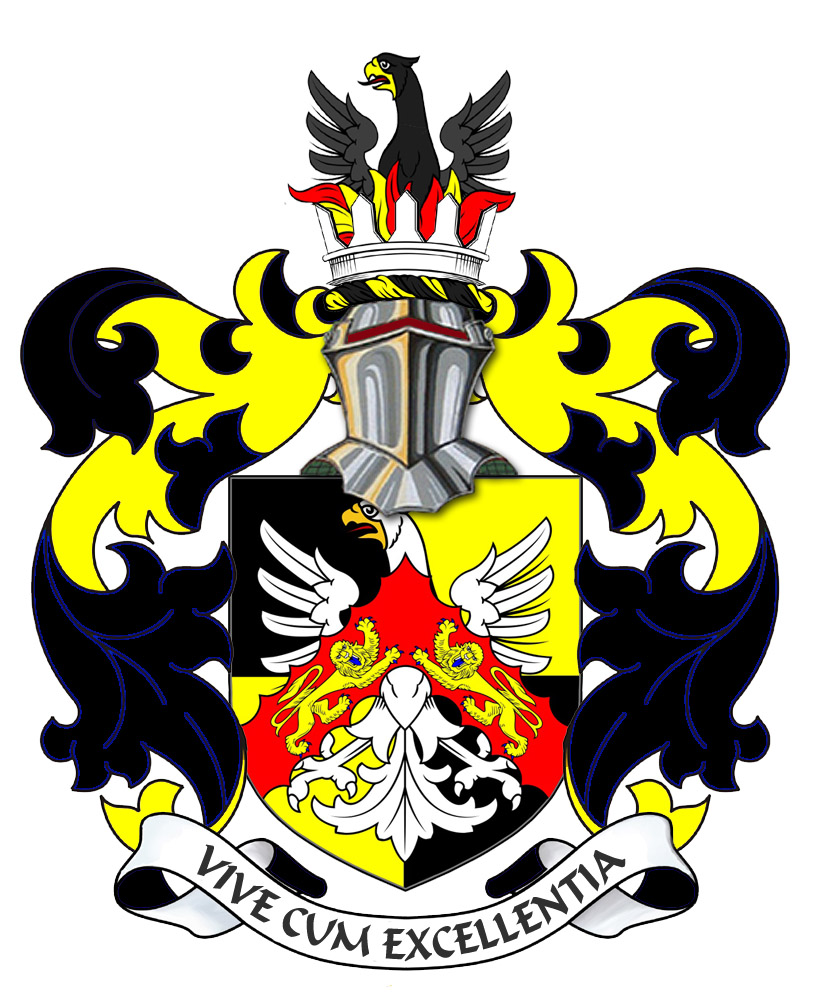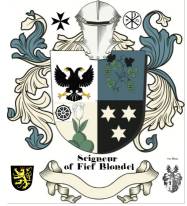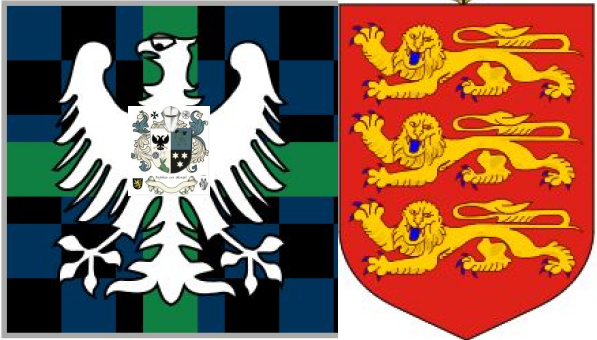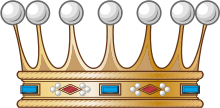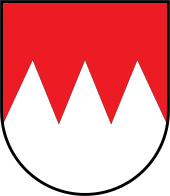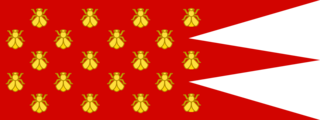

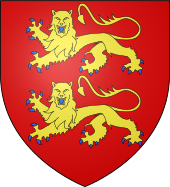
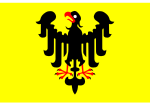
The House Order of Vigilance or of the White Falcon has been revived by the Kingdom of the Franks. The White Falcon Order had been the only order of the Duchy and later Grand Duchy of Saxe-Weimar-Eisenach. The medal recipients werelisted in the country'sstate manuals but the Duchy was Dissolved.
 Breast Star awarded to
Goethe by
Grand Duke
Carl
August in 1816 for
the Grand Cross of the
House Order of the White Falcon
Breast Star awarded to
Goethe by
Grand Duke
Carl
August in 1816 for
the Grand Cross of the
House Order of the White Falcon
In the Middle Ages, falconry was usually the entertainment of the nobility, and the falcon was considered a sign of nobility and a symbol of vigilance. As early as the Middle Ages there was a knights' association for falcons . The white gyrfalcon in particular was held in great esteem until the 18th century. [1] Duke Ernst August of Saxe-Weimar founded the Order of the White Falcon as the Ordre de la Vigilance (Order of Vigilance) on August 2, 1732. The foundation was made with the approval and in honor of Emperor Charles VI. , whose cavalry generalErnst August had been since 1732. Over time, however, the number of members fell sharply and the order fell into decline. In 1806 only one knight of the order was still alive; in 1810 the order had become extinct untill revived after 200 years. [2] When Duke Carl August became Grand Duke by the Congress of Vienna after 40 years of rule and his territory was expanded, the order was revived on October 18, 1815 as the House Order of Vigilance or of the White Falcon and received new statutes. It imposed on the owner the duty to be loyal and devoted to the respective legitimate highest national authority, to promote patriotism and to care for the invalids and war survivors of the liberation wars . The old medals were retained. The Grand Duke was the Grand Master and the Chairman of the State was the Chancellor of the Order . The day of the order's festival was October 18th every year, the anniversary of the Battle of Leipzig .  Award diploma
for Knight of the House Order of Vigilance or the
White Falcon for the Grand Ducal Saxon
Chancellor
Gustav
Wittich from 1840
Award diploma
for Knight of the House Order of Vigilance or the
White Falcon for the Grand Ducal Saxon
Chancellor
Gustav
Wittich from 1840
Order classesThe order initially consisted of only 24 knights. According to the statues of October 18, 1815, the order consisted of three classes and the number of members was limited:
An expansion took place on February 18, 1840:
A silver Cross of Merit was donated on July 8, 1878 [3] and a gold one in 1902. [4] Order decoration Decoration of the commanders with
star of the House Order of the White Falcon
Decoration of the commanders with
star of the House Order of the White Falcon
The order consists of a gold-framed, green -enameled Maltese cross hanging from a crown . In each corner of the cross arm there is a red enameled scaled star with a gold border. On the front lies a white enamel falcon with outstretched wings. The back of the cross shows a green star on white enamel , an oval medallion with an enameled blue showed the four-line order motto VIGILANDO ASCENDIMUS (vigilantly we ascend) in golden letters. Everything is surrounded by a golden laurel wreath and crown. The Cross of the Knights II Class ( Cross of Honor ) shows the Grand Duke's name on the back. Since 1870, the medal has been awarded for military service with crossed swords through the cross angles. Carrying methodGrand crosses were worn on a sash from the right shoulder to the left hip with an eight-pointed breast star bearing the order's emblem. Commanders decorated around their necks and wore a four-pointed breast star, knights 2nd and 1st classes, and holders of the Cross of Merit on the ribbon on the left side of the chest. The ribbon was red. On special occasions, the Grand Cross was worn on a necklace . The individual chain links alternately show a golden falcon and the letters CA (Carl August). Known carriersliterature
Web links
Commons : House Order of the White
Falcon - collection of images, videos and audio files
Individual evidence
|
Kingdom of West Francia Lord Paramount Feudal Barons The Seigneur Charter of Liberties Viking Kingdom Extended Continental Shelf Fief Worship Fiefs of the Islands Fief de l'Eperon Order of the Iron Crown Blondel Privy Seal Fief DuQuemin Bouvée Phlipot Pain Bouvée Torquetil Bouvée Bourgeon Channel Island History Feif Court Styles and Dignities Fief Blondel Islands Court of Chief Pleas Seigneurs and Dames Travel Research Order of the Genet Order of the Genet Order of the Star Est. 1022 Order of the White Falcon Territorial Waters Order of Celestines Knights of theThistle of Bourbon A Funny Think Happened On the Way to the Fief Arms Motto Flower Chancellor Hereditements Guernsey Bailiwick of Guernsey - Crown Dependency Papal Bull Norse Normandy Fief Rights Blondel and King Richard Press Carnival Store Portelet Beach Roquaine Bay Neustrasia Columbier Dovecote Fief Blondel Merchandise Fief Blondel Beaches Islands Foreshore Events Fiefs For Sale Sold Fief Coin Viscounts de Contentin Fief Blondel Map Feudal Guernsey Titles The Feudal System Flag & Arms Fief Videos Guernsey Castle Advowson Site Map Disclaimer Livres de perchage Lord Baron Longford Dictionary
Feudal Lord of the Fief Blondel of the Nordic Channel Islands Guernsey Est.
1179
Feudalherr - Fief Blondel von der Nordischen Insel Guernsey Est. 1179
New York Gazette - Magazine of Wall Street -
George Mentz -
George Mentz - Aspen Commission
Counselor George Mentz Esq. - Seigneur Feif BlondelBaron Annaly Baron Moyashel Grants to Delvin About Longford Styles and Dignities The Seigneur Court Barons Fiefs of the Islands Longford Map The Island Lords Market & Fair Fief Worship Channel Island History Fief Blondel Lord Baron Longford Fief Rights Fief Blondel Merchandise Events Blondel and King Richard Fief Coin Feudal Guernsey Titles The Feudal System Flag & Arms Castle Site Map Disclaimer Blondel Myth DictionaryKingdom West Francia Kingdom of the FranksMentz Scholarship Program 101 Million Donation - Order of the Genet Knighthood |
